KELLY MILLER
MILLER, KELLY. Americans believing in the intrinsic worth and possible nobility of every man, regard with particular pride and appreciation those who in early life have overcome peculiar limitations. The more limited the outlook in childhood, the more creditable to the man who attains it is the expansion of view which comes with education. We are gratified when one whose natural ability lies in any definite direction, discovers his own latent power, and devotes himself to the development and to the practical use of that faculty for the general good; since extraordinary faculties of mind do not always find the means of cultivation, or attain to adequate expression. It is impossible that Americans should not feel still greater pride when one of a race whose circumstances have shut them out so largely from sources of knowledge and culture, rises to eminence in a difficult department of science, through his own self-denying and strenuous exertions. When the general level among one's own race and people is comparatively low in matters of education, it means much when an individual transcends this restriction and contributes notably not only to the uplift of his own race, but to advanced research and scholarly investigation in technical science.
Such a man is Kelly Miller, lecturer, mathematician and since 1890 professor at Howard university, Washington, District of Columbia. He was born in Winnsboro, South Carolina, July 23, 1863, son of Kelly and Elizabeth Miller. His father was an industrious farmer and her son says of his mother that she exercised "a strong influence on his moral nature." His uncle, Isaac Miller, was a member of the South Carolina legislature. Young Kelly worked upon the farm with wholesome effect upon his health; and while poverty and poor school facilities were drawbacks to his progress, his perseverance and the remarkable power of mind shown even in early childhood, enabled him, when seventeen, to join the junior class of the preparatory department of Howard university at Washington, District of Columbia. It is said of him as a boy that while his grasp of nearly
